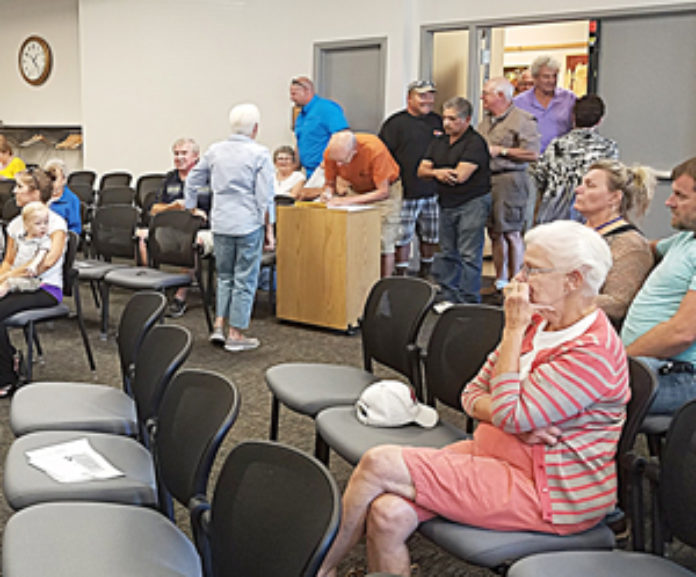Both sides of a noise controversy at the fairgrounds made their case before Code Enforcement Hearing Officer Lawrence Clifford Monday for nearly three hours, but no ruling was reached after the sometimes heated discussion.
Instead, Clifford took everything under advisement.
In the case of the City of Warsaw v. Kosciusko County Community Fair Inc., on July 24 Code Enforcement Officer Dana Hewitt cited the Fair Board for violation of the city’s noise control ordinance because of loud noise and music emanating from a Latino rodeo, operated by Gabriel Lopez.
Lopez has rented the fair facilities for a number of years for the rodeo, averaging about five or six rodeos each year.
Attorney Ed Hearn, representing the Fair Board, explained that the fairgrounds are available for rental to anyone and Lopez has rented a certain portion of the fairgrounds on a number of occasions. On the day of the complaint, July 24, Lopez was conducting a rodeo at the fairgrounds from about 11 a.m. to 10 p.m., Lopez’s attorney, Jim Brugh, stated.
City attorney Mike Valentine said the ordinance that the city is concerned with deals with continuous loud noises.
Before Valentine called up the city’s first witness, Brugh asked the case be dismiss based on the constitutionality of the city’s ordinance.
Hearn had a separate filing as well, bringing up the Fifth Amendment to the Constitution regarding due process.
Clifford took Hearn’s and Brugh’s motions under advisement and proceeded with the hearing.
As his first witness, Valentine called Warsaw Police Department Cpl. Wayne David Wilkey. Wilkey testified he was on second-shift duty July 24 from 2:30 to 11 p.m. He said, “The sounds coming from the fairgrounds were clear. The music. The bass.” He said he was “all over the city” when he heard it, including the far northern part of the city at about 9:30 p.m. at Canterbury Apartments, about 2-3 miles from the fairgrounds.
Police dispatch indicated to Wilkey that at least 20 complaints about the fairgrounds were noted on the call log.
Warsaw Police Officer Rogelio Navarro said music from the fairgrounds was very loud and he could hear a man speaking Spanish. Navarro, who speaks Spanish, said he drove by the fairgrounds and he could hear what was being said. He said some of the language very offensive.
Fair Board President Randall Shepherd took the stand and said there have been five rodeos held this year.
Valentine asked Shepherd if he recalled talking with him and Mayor Joe Thallemer about whether or not the noise level at the rodeos could be toned down and reaching some agreement on the fair board’s ability to continue on. Shepherd said he did recall that and his response was that he would talk to Lopez. “We don’t control any event that we rent grounds to per se for noise problems,” Shepherd said.
Hearn asked if Lopez or the rodeo had ever been cited for anything illegal as far as the rodeo goes, and Shepherd said they had not.
The July 24 citation was the first time the city issued a citation against the fair board, Shepherd said.
Mary Clemens, who has lived across the lake from the fairgrounds at 1121 Country Club Lane for 19 years, testified. She said the noise was loud inside the home even with the windows closed. “It was so loud and the vibrations were so strong … my mind kept going to what it would be like to be in a torture chamber, to be honest, where just that constant BOOM, BOOM, BOOM, not being able to almost hear yourself. Definitely not being able to be outside, on our patio, in our yard … and having a conversation like we are here.”
She estimated the noise began before noon and ended around 10 p.m. on July 24.
Valentine then began asking Clemens about a petition she had brought to him.
Clemens said the purpose of the petition was, “To simply, politely request that the noise level, the duration and the beat of the bass be toned down. Not to the point where we can’t hear it. We don’t expect to not hear it, but we expect to be able to enjoy our own home without that being forced upon us and disturbing our peace.”
Clemens said she and nine other people collected more than 187 signatures on the petition. She said they were “absolutely not” asking that the rodeo be shut down.
For his first witness, Hearn recalled Shepherd to the stand. Shepherd said the fair board rent out facilities for concerts, weddings and whatever it can rent the ground out for. He said the $2,000 in rent “can make a difference whether we open up this month or not because we live on a shoestring. We don’t have a lot of funding. We’re not a county owned association. We’re not county funded in any way, shape or form, and the only money we get is whatever we rent the buildings for or whatever we rent the facility for. So every penny we get in usually goes back out to keep the operation running.”
Shepherd said Lopez has been doing about four or five rodeos per year since 2013, but increased that by one this year. The rodeos start in May and end in September. Hearn asked Shepherd to discuss what the relationship was like between the fairgrounds, fair board and some of the neighbors.
“We’re not very well liked within that neighborhood because of the history with the race track, the dirt, the noise, the other events we put on sometimes are noisy. It’s a constant battle with complaints coming in from the neighborhood,” Shepherd stated.
Kosciusko County Sheriff’s Department Lt. Don Wiesehan testified that while he used to be on the fair board, he is now a security consultant for the fairgrounds. Wiesehan said the rodeo on that night was loud, but when the WPD sent an officer they complied and turned down the volume.
Lopez said everything was going overboard and he just wants to work together with everyone so he can run his rodeos but not disturb the neighbors. He said he wants to work with the city to find an acceptable noise level, but everyone should have to follow the same guidelines including the city’s summer concerts.
After further discussion of acceptable noise levels and decibels, Clifford said he will take everything under advisement and adjourned the hearing.





